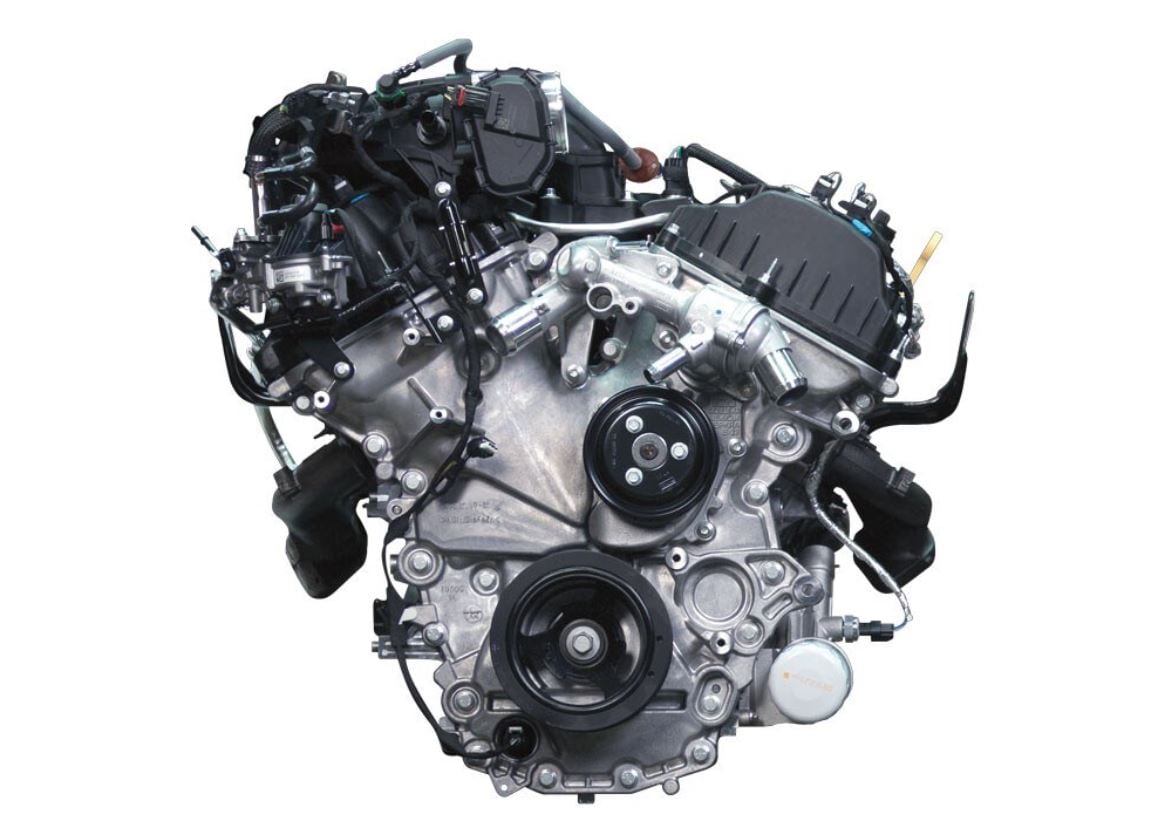
The Ford EcoBoost engine has earned a reputation for its blend of power and efficiency, but like any advanced technology, it is not without its challenges. In this article, we’ll take a close look at the most common Ford EcoBoost engine problems that drivers may encounter. From turbocharger issues to oil dilution, understanding these common Ford EcoBoost issues can help you maintain the engine’s performance and longevity. Regular Ford EcoBoost maintenance is essential to ensuring optimal reliability, allowing you to avoid costly repairs and keep your engine running smoothly. We’ll explore these potential pitfalls and provide insights into preserving your Ford EcoBoost reliability for the long haul.
For reliable SUVs and trucks that wont break your piggybank, check out our used vehicle inventory.
Also Read: Common Causes of Ford F-150 Transmission Problems
Coolant Intrusion
Coolant intrusion is among the most serious Ford EcoBoost engine problems, particularly for models featuring the 1.5L, 1.6L, and 2.0L engines. This issue arises when the engine design allows coolant to leak into the cylinders. Symptoms often include overheating, engine misfires, and visible white smoke from the exhaust, signaling the burning of coolant. Left unaddressed, this problem can escalate to a blown head gasket or even engine failure, making it one of the most critical Ford EcoBoost problems to avoid.
Addressing coolant intrusion typically involves replacing the head gasket, repairing the engine block, or, in severe cases, replacing the entire engine. Some affected models were part of technical service bulletins or recalls, with Ford providing repairs or extended warranties. Regular maintenance and vigilance for overheating or other signs of trouble can help reduce the impact of these common Ford EcoBoost issues.
Carbon Build-Up
Carbon build-up is another common Ford EcoBoost engine problem, affecting vehicles with direct fuel injection systems, such as the 1.0L, 1.5L, and 2.0L EcoBoost engines. In these engines, fuel is injected directly into the combustion chamber, skipping the intake valves, which leads to carbon deposits forming over time. These deposits can obstruct airflow to the engine, causing poor performance, engine misfires, or knocking sounds. If left unchecked, carbon build-up can reduce fuel efficiency and even result in more severe engine damage.
To prevent carbon build-up, routine maintenance is essential. While the design of EcoBoost engines limits the benefits of port injection, which helps clean intake valves in traditional engines, some owners opt for periodic intake cleaning, such as walnut blasting. Addressing this issue early can help avoid expensive repairs and ensure the engine runs smoothly. Keeping an eye on performance drops and regularly cleaning the intake valves can prevent these common Ford EcoBoost issues.
Turbocharger Issues
Turbocharger issues rank among the more serious Ford EcoBoost engine problems, especially in early models featuring the 1.6L and 2.0L engines. A failing turbocharger can lead to noticeable symptoms, including loss of power, a high-pitched whining noise, and excessive smoke from the exhaust. These issues often stem from insufficient lubrication, overheating, or debris damaging the turbo’s delicate components. Left unresolved, turbocharger failure can impact engine performance and reliability, making it one of the significant Ford EcoBoost problems to avoid.
Preventive maintenance is key to reducing the risk of turbocharger failure. Regular oil changes using high-quality oil recommended for turbocharged engines ensure proper lubrication and heat dissipation. Avoiding aggressive driving during the engine’s warm-up and cool-down phases also protects the turbocharger. Staying attentive to early warning signs and addressing them promptly can help drivers steer clear of costly repairs, ensuring their EcoBoost engine remains efficient and reliable.
Timing Belt/Chain Problems
Timing belt and chain problems are significant Ford EcoBoost engine problems that can lead to costly repairs if ignored. The 1.0L EcoBoost engine, in particular, is known for its unique timing belt design that runs in oil for enhanced lubrication and efficiency. Over time, the belt can degrade and shed particles into the oil, potentially leading to clogging and engine damage. Symptoms of timing belt or chain issues include a ticking noise, poor performance, or in severe cases, total engine failure. These problems are among the more critical common Ford EcoBoost issues to address promptly.
Replacing the timing belt or chain at the intervals specified in the vehicle's maintenance schedule is essential for preventing unexpected failures. Staying proactive with these maintenance tasks can help drivers avoid some of the more serious Ford EcoBoost issues and keep their vehicles running reliably for years.

Oil Dilution
Oil dilution is a significant concern among Ford EcoBoost engine problems, particularly in models equipped with the 2.7L and 3.5L EcoBoost engines. This issue occurs when unburned fuel mixes with engine oil, leading to a decrease in oil's lubricating properties. It often happens during short trips or cold weather driving when the engine doesn’t reach its optimal operating temperature. The presence of excess fuel in the oil can lead to poor engine performance, increased wear, and potential damage to engine components. Recognizing and addressing oil dilution early can help prevent severe consequences.
To avoid this common Ford EcoBoost issue, it is crucial to perform regular oil changes using high-quality oil and follow the manufacturer’s recommended maintenance schedule. Ensuring the engine warms up fully before driving and avoiding frequent short trips can also help mitigate the risk of oil dilution. Monitoring oil levels and quality regularly can help detect early signs of dilution, allowing drivers to address the issue before it leads to costly repairs. Staying proactive with these preventative measures can help avoid one of the more troublesome Ford EcoBoost problems to avoid.
Overheating
Overheating is one of the most common Ford EcoBoost engine problems, affecting several models in the lineup, especially those equipped with smaller turbocharged engines. When the engine reaches excessively high temperatures, it can cause severe damage, including warped components, blown head gaskets, and internal leaks. Overheating often results from coolant system failures, such as leaks in the radiator or malfunctioning thermostats, which prevent the proper circulation of coolant. Signs of overheating include the engine temperature gauge rising too high, steam coming from under the hood, and unusual engine noises. Ignoring these symptoms can lead to more serious consequences and costly repairs.
Checking the coolant levels, inspecting hoses for wear or leaks, and ensuring the radiator fan operates properly can help avoid the common Ford EcoBoost issues that lead to overheating. Additionally, ensuring the engine’s cooling system is flushed and refilled with the manufacturer-recommended coolant at regular intervals can extend the life of the engine and prevent overheating.
Low-Speed Pre-Ignition (LSPI)
Low-speed pre-ignition (LSPI) is one of the more complex Ford EcoBoost engine problems, often associated with smaller displacement turbocharged engines, like the 1.0L, 1.5L, and 2.0L EcoBoost. LSPI occurs when the air-fuel mixture in the cylinder ignites prematurely, causing knocking or detonation at low speeds under high load. This abnormal combustion can lead to significant engine damage, including cracked pistons or damaged connecting rods, and often manifests as a rough idle or unusual engine noises. LSPI is a particular concern in modern engines with high compression ratios and direct fuel injection systems, making it a critical issue among common Ford EcoBoost problems to avoid.
To reduce the risk of LSPI, using high-quality fuel with the correct octane rating is essential, as lower-grade fuel is more prone to igniting prematurely. Additionally, staying on top of regular maintenance, such as proper oil changes, ensures the engine’s management system is functioning efficiently to prevent excessive pressure and temperature fluctuations in the cylinders.
Conclusion
In conclusion, understanding and addressing Ford EcoBoost engine problems is essential to maintaining the performance and longevity of your vehicle. While common Ford EcoBoost issues like turbocharger failures, carbon build-up, and overheating can be daunting, regular Ford EcoBoost maintenance can help mitigate these risks. With proper care, Ford EcoBoost reliability remains within reach, helping you enjoy a smooth driving experience for years to come.
For those who need a used car but struggling with bad credit, get in touch with us today and see how we can help.
